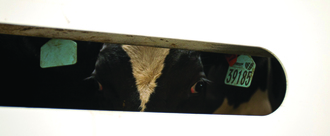-
Return Charlie Girl Kākā to her whānau and her home of 24 years in Te Anau.We believe that Aotearoa is a place where nature and animals are cared for and respected. We have a long history of taking care of our bird life and believe this practice needs to continue. Sadly over four months ago the Department of Conservation moved Charlie Girl Kākā (also known a New Zealand Forest Parrot) from her home of 24 years to 'boost chick numbers' at their facility in Dunedin.[1] This is despite concerns being raised before the move and immediately after. Three major welfare concerns for Charlie have been raised by five veterinarians, multiple parrot experts, and many Te Anau residents.[2] Internal emails reveal Charlie Girl was weaving within the first hour at Dunedin. Weaving is a stereotypical distress behaviour, and Charlie is clearly overwhelmed by the environment at the Dunedin breeding facility. Despite this, no action was taken to support Charlie. Carol, Charlie's first keeper, who cared for her for a decade, was aware of Charlie weaving in July. Still action was taken. We have documented Charlie's increasing physical pain since her relocation to Dunedin, as her arthritic left wing sags more and more with each passing week. Charlie is weaving from the ceiling from distress[3]. And on top of all that she is kept with a frustrated and aggressive male who keeps harassing and attacking her. Charlie Girl was well cared for and loved in her home in Te Anau. She had supportive keepers and volunteers, a Voluntary Physical Therapy Program, and individualised care. DOC says Charlie can go 'anywhere but home' and that Te Anau is not a 'favoured' location for her.[4] Charlie is suffering in Dunedin while DOC refuses to admit a mistake. Internal emails reveal DOC acknowledged concerns for Charlie's welfare before the move. But now that she is struggling in Dunedin, DOC refuses to acknowledge concerns and claim she is fine. DOC even went on One News and admitted that even though she 'can't really fly well' she is somehow 'robust' enough for 'a bit of fun' when being harassed by the male kākā. None of this is acceptable, and sets a dangerous precedent for the care of our captive manu (birds). We need to speak up for Charlie Girl. She is taonga (treasured) and deserves to be home. Check out our facebook page for video evidence of our welfare concerns on Charlie Girl. Her community is distraught by what is happening to her in Dunedin and want her home: https://www.facebook.com/share/v/15FrwjUxiM/ References [1] https://docs.google.com/document/d/1KeIPut9WGFpYZ-5Z_OcOijTelIVNYS-QQdyrIyl7KU4/edit?usp=sharing [2] https://drive.google.com/drive/folders/10PW2KAcPZ7wFSwumiXf8Q_4gczxIhLa4 [3] https://www.facebook.com/helpcharliekaka/videos/1612541019355029/?fs=e&mibextid=Mk4v2M&rdid=3fLzOg3fngTJT7O3# [4] https://drive.google.com/drive/folders/10PW2KAcPZ7wFSwumiXf8Q_4gczxIhLa42,848 of 3,000 SignaturesCreated by Christina Abramowicz

-
Ban Misleading Labelling for Vegetarian and Vegan ProductsWith the increase in the use of buzzwords on packaging, it is becoming unclear what is in our food unless you read through the entire list of ingredients. We want clear labelling and a ban on using vague and misleading terms. Consumers need to know what they are buying without reading everything on the packet, and this is particularly important for those with allergies. The current Food Standards Code provides a foundation for food labelling requirements, but it lacks specific provisions for vegan and vegetarian labelling, leading to ambiguity and confusion for consumers[1]. Introducing new provisions that standardise and clarify these terms would address these shortcomings, aligning with the Code's objectives of consumer protection and fair-trade practices. We envision a future where consumers can make informed, ethical, and confident choices about the products they purchase. By advocating for clear, standardised, and enforceable labelling regulations, we aim to eliminate ambiguity and ensure transparency in the labelling of vegetarian, and vegan products. [1]The current Food Standards Code Legislation ANZ can be viewed here: https://www.foodstandards.gov.au/food-standards-code/legislation Further reading: • https://www.foodstandards.govt.nz/consumer/labelling/Labelling-consumervalueissues • There are a number of products currently on the NZ market that have misleading labels, the most recent of which was reported by The SpinOff here: https://thespinoff.co.nz/kai/22-03-2024/vegan-advocates-claim-dessert-branding-misleading-mpi-says-otherwise • Animal genes are now being edited into soy beans. You can read more about that here: https://vegansociety.org.nz/animal-genes-in-soy-is-unacceptable/ • And also here: https://www.feedandgrain.com/grain-handling-processing/biotech-crops/news/15669206/moolec-science-receives-usda-approval-for-pig-protein-soybean1,422 of 2,000 Signatures
-
Save Kaiti Beach; PROTECT our History and BiodiversityEastland Port is planning to carry out substantial construction work to expand their port in Tūranga-nui-a-Kiwa Gisborne. This includes further reclamation of reef and ocean space near the river mouth and more dredging with disposal of materials to the off shore disposal ground located within the bay.(1) These proposed works would create further loss of habitat for taonga species, fail to respect significant cultural values and will distort a precious historical site of Aotearoa New Zealand. The species currently occupying this area are Kororā (little blue penguin), Toreā (oystercatcher), Taranui (caspian tern), Matuku Moana (white faced heron), Kāruhiruhi (pied shag), Kawaupaka (little shag), Tākapu (gannet), Karoro (black backed gull), Kōtare (kingfisher), Kekeno (fur seal), Whai (stingray), Kōura (crayfish), Kākahi (fresh water mussel), Pāpaka nui (purple rock crab), Kina (sea urchin), Manaia (seahorse) to name a few. Orca whales also feed from the reef with their young at certain times of the year. Previous construction work by Eastland Port destroyed an estimated 35 to 70 kororā (little blue penguin) nests during the breeding season in 2021. The habitat was located within the rock wall where the port carried out demolition and reclamation.(2) The consent granted to Eastland Port was a Limited notification which didn't allow for Public Submissions. The site of the proposed works is described as nationally and internationally significant to our country. A natural reef formation used by ancestors of Māori as a landing point dating back many centuries ago. The landing entrance later saw an arrival of Europeans. Kaiti Beach represents a significant historical site used by both our Māori and Pākehā ancestors. In the words of Dame Anne Salmond: “The foreshore of the Tūranaganui River is one of the world’s great voyaging sites. It is the landing place of the Horouta canoe, celebrating the achievements of the Polynesian star navigators. It is the place where Captain James Cook and his companions first came ashore in New Zealand, heralding the traditions of European exploration and discovery. It is the site where Tupaia, the Ra’iatean high priest navigator who sailed with Cook, first met Māori, marking the links between local people and their ancestral homelands. It is a meeting place of cultures, of challenges and shootings, as well as friendly exchanges. Here Captain Cook and a local man saluted each other with a hongi on Te Toka-a-Taiau, the first greeting between a Māori and a European. It is a sacred site for all New Zealanders, to be celebrated with pride and treated with dignity."(3) In the words of Sir Derek Lardelli: Te Toka-a-Taiau, the rock of Taiau, Te Pito o Te Ao, is the core of our universe, a Tairawhiti perspective Ko Te Toka-a-Taiau, Te herenga o ngā wai mai te hononga o ngā rua Te Toka-a-Taiau is the spiritual gathering place of our ancestors Ko Te Toka-a-Taiau, Te whakatinanatanga o te whakapapa We are the kaitiaki guardians of this very sacred site and Te Toka-a-Taiau is the physical reminder of our commitment to the land, the people and our environment Ko Te Toka-a-Taiau he mauri tipua Te Toka-a-Taiau is the spiritual essence of our ancestors Ko te Toka-a-Taiau he mauri tawhito Te Toka-a-Taiau is a spiritual essence from ancient times He mauri no te kukunetanga mai i Hawaiki The spiritual essence from the origins of time and the spiritual homeland of Hawaiki Mauritū nei hei ahurewa tapu That stands as a sacred alter Mauritū nei hei tūāhu tapu That stands as the launching pad of our destiny"(3) We believe all people of Aotearoa New Zealand would consider this a significant piece of history and we need to protect the area from further disruption and modification. We ask you to join us in saying “Enough!” to Eastland Port and Gisborne District Council. Join us in calling for the protection of this natural environment, a life source, a habitat of taonga species, a significant piece of history connecting each of us to our identity. We must protect it for future generations so they can connect to their history. This is our chance Aotearoa New Zealand, let's stand together, side by side to give this area the respect and dignity it deserves. Let it be your time in history to help shape this moment and move us all forward in an ethical direction to let the healing begin. Thank you for your time and consideration in signing this petition. This petition will be used as evidence for public support to deny the consent application submitted by Eastland Port. References: 1. https://www.gdc.govt.nz/consents-and-licenses/notified-consents/notified-consents/Eastland-port-limited 2. Recommendations for penguin management for the Waikahua seawall project at Eastland Port (December 2021). Dr. John Cockrem. https://www.gisborneherald.co.nz/frontpage-featured/20211223/seawall-deadly-for-korora/ 3. The Tūranganui River; A Brief History (October 2006). Michael Spedding. Articles: https://www.stuff.co.nz/national/126798579/little-penguins-left-dead-injured-and-homeless-after-seawall-rebuild-in-gisborne https://www.gisborneherald.co.nz/frontpage-featured/20211022/penguin-alert-locals-urged-to-keep-an-eye-out-after-korora-little-blue-pen/ https://www.gisborneherald.co.nz/local-news/20211027/call-hotline-first-regarding-wildlife-concerns-or-findings-department-of-c/ https://www.gisborneherald.co.nz/local-news/20211028/port-stops-work-pending-search-for-penguin-nests/ https://www.gisborneherald.co.nz/frontpage-featured/20211202/rallying-for-korora/ https://www.gisborneherald.co.nz/frontpage-featured/20211223/seawall-deadly-for-korora/ https://www.gisborneherald.co.nz/frontpage-featured/20220108/penguin-safety-fears/ https://www.gisborneherald.co.nz/frontpage-featured/local-news/editors-pick/20220603/taking-care-of-penguin-business/173 of 200 SignaturesCreated by Waikahua Kororā Kohanga Group .
-
SPCA: Take action on TikTok possum puncherThe TikTok showed the New Zealand man punching a possum in the face, outraging animal advocates and people across New Zealand. The video shows a young possum perched on a fence with a voice saying “Hey dick, what are you doing there?” A second voice asks “Shall I smack him?” The first voice answers “Smack him.” A closed fist is then seen punching the possum hard in the face causing it to fly off the fence backwards. An audible smack can be heard. Laughter from the two individuals which aren’t shown on camera follows. Direct Animal Action believes the video is deplorable and is an act of animal cruelty. While possums are considered 'pests' in New Zealand, what is shown in the TikTok is blatant animal cruelty and is not acceptable behaviour. The fact that it is being glorified on social media makes it even more disturbing. Unfortunately possums have been demonised in New Zealand due to their legal status as pests. This has encouraged a culture in our country where cruelty towards animals classified as pests, like possums, is seen as acceptable to many New Zealanders. SPCA New Zealand say they have seen an upswing in cruelty towards animals classified as pests in recent years and that, under the law, animals may be killed humanely, but causing cruelty to an animal is against the law and in breach of the Animal Welfare Act. Direct Animal Action have reported the TikTok to SPCA New Zealand and an investigation is now underway. We are calling on the SPCA not to take this lightly because the animal involved is classified as a pest, but to take serious action under the Animal Welfare Act. We would also like the man to undertake community service at his local SPCA animal shelter, so that he can learn the importance of compassion and respect towards all animal species. People need to know that animal abuse should not be used as a tool to get more views, likes and shares on social media and that all animals are sentient, capable of pain and suffering, regardless of their legal classification.2,076 of 3,000 SignaturesCreated by Direct Animal Action

-
Make All Resource Consents for Factory Farms Open to Public SubmissionThe Waikato Regional Council is currently processing two applications to build industrial factory farms in the region. Buchanan Ellis Ltd have applied to build 6 new sheds that will house 42,000 chickens each in Waerenga and PIC New Zealand Limited have applied to triple the size of their commercial piggery to house 12,000 pigs in Maramarua. Both of these applications are limited notification, meaning the Council is not allowing the public the right to make submissions on these resource consents. We believe that factory farms are an issue of importance for the entire Waikato community due to animal welfare, environmental and health concerns, not just an concern for those who happen to live directly beside one. More than 70 percent of New Zealanders are opposed to factory farming and the overwhelming majority of Waikato residents do not want more factory farms built in our region. We should have the right to express this view to our local council in a healthy democracy.207 of 300 SignaturesCreated by PAAW NZ

-
Stop the Waerenga industrial meat chicken farmChickens farmed for meat have been selectively bred to grow rapidly over a five-six week period before they are slaughtered. At five-six weeks old, they will reach adult weight but they are still baby chicks. This puts incredible stress on their young bodies which struggle under the rapid growth. Many chicks die before even reaching five-six weeks old. Others will suffer lameness due to severe stress on their hip and leg joints, affecting their ability to walk. Buchanan Ellis Ltd want to build a free-range industrial meat chicken farm at Waerenga - however free-range isn't all it's cracked up to be. There are no industry standards or regulations for free-range in New Zealand, only that there must be a potential to access the outdoors. Since most free-range meat chickens are slaughtered at five-six weeks old, the amount of time they have to go outside is only around two-three weeks. In their first few weeks of 'growing' they are shut inside industrial buildings with around 40,000 other meat chickens. In practice, many chickens will never get outside because they have to get past thousands of other chickens to reach ‘pop holes’ to the outdoors. In addition, chickens are hierarchical by nature, meaning dominant chickens will often guard pop holes, denying less dominant chickens outdoor access. The Buchanan Ellis Ltd proposal would see six industrial farm buildings built at the Waerenga site, each containing 43,000 meat chickens. This would see 258,000 meat chickens suffering on site every six week cycle. Over the course of a year around two million meat chickens would be grown at the proposed Buchanan Ellis Ltd factory farm. As well as animal welfare concerns, there is significant community opposition to the Buchanan Ellis Ltd proposal. Locals are concerned that odour and dust levels from the proposed industrial meat chicken farm will negatively impact their homes, health and livelihoods. Increased heavy traffic movements impacting on road safety, appropriate water drainage and effluent disposal and damage to nearby wetlands are also among the community concerns. The application is limited notification, meaning that many of the affected locals and the general public cannot make a submission about the proposed factory farm. Given the significance of the Buchanan Ellis Ltd proposal on the local community and the animal welfare implications, Direct Animal Action believes the application should be publicly notified and, ultimately, that Waikato Regional Council should decline the application.1,565 of 2,000 SignaturesCreated by Direct Animal Action

-
Keeping Cats Safe in AucklandHave you ever come across a cat or kitten who has died crossing the road? If you haven't, then you are fortunate and, you don't live near where I live. I have lost count of the number of cats that have lost their lives crossing roads; mostly at night and not always on busy streets. The worst time of year has been around Guy Fawkes night. Then the number of cats that die is significantly higher than the rest of the year. I decided to do some research on the subject, including how other countries handle this issue problem. Here is what I discovered. In Brisbane, Australia, in 2017, the Brisbane Council enacted the Animal Local Laws Act that requires people who have companion cats to microchip them, keep the microchip details up to date and the cat must have a collar containing contact information. As well you are required to keep your cat on your property. They do not have to be indoors all the time; they can be kept in an enclosure which could be connected to your house by a cat door or some other means. You can keep up to three companion cats without a permit; however, if you want more than a license is needed. I also looked at what they do in England to keep cats safe. They also recommend keeping cats in at night because accidents are more severe at night/in dark hours, including morning/afternoons in winter months. They also noted that it is not just road that are hazards for cats at night but that they can become injured through contact with other animals, including wild animals. There have also been problems with people in London going out at night killing cats. They have also recommended that a cat owner put a reflective or fluorescent quick-release collar on the cat as it may help them be seen. Research by Pet Insurance companies in England found that approximately 78% of all road traffic accidents involving cats happen at night. Specialists in both countries agree that you should never lock a cat out at night. Our family has always kept our cats in at night. While they were young adults, they may have tried to escape on occasions and be a little restless; however, they soon adjust. Cats are hunters; however, there is no reason why they should be allowed to roam around at night. Our cats have adopted the same sleep pattern as us of sleeping at night time. We had an old aviary that we attached to our house via a bedroom window, and that worked well. If your yard is completely fenced its possible to use a fence attachment such as the Oscillot cat fence which is a paddle system that attaches to the top of a wall, making it impossible for a cat to climb over. If you Google search you can find a variety of ideas and designs. In Auckland, there is no limit on the number of cats you can keep on your property. There is no legislation as such, only a responsible cat owner guidelines. There are bylaws protecting dogs and preventing them from becoming a public nuisance, but there are none concerning cats. Why not? In Auckland, anyone who witnesses pain or suffering of a cat needs to report it to the police and or the SPCA; otherwise, they breach the Animal Welfare Act. All well and good, however, this gives no protection to cats nor stops them from becoming a hazard. A recent Wellington study found that on average cats crossed four roads per day. While the Aminal Welfare Act contains a level of recognition that keeping cats safe means keeping the contained inside the home or on the property, there is no legal obligation to do so. The NZ Government has a Code of Welfare: Companion Cat which came into effect from October 2018. Once again it only contains recommendations such as keeping your cat indoors between dusk and dawn, keeping them indoors when fireworks are in use. The document states that some cats prefer to be out at night and will find their place under houses, in garden sheds, in dense undergrowth, etc. How is this responsible cat ownership? Are they genuinely saying that cats know that is best for them? The document has a lot of useful information on feeding, health and breeding but about from recommending that they are kept inside at night, there is nothing that protects a cat. Recommendations are one thing, but legal requirements are another. It's time to make a change, to act decisively to ensure the safety of all cats in Auckland, ensuring that they also do not become a community problem. Please sign and share the petition.66 of 100 SignaturesCreated by Amber Ranganui
-
Demanding Action Against Animal ExperimentationUsing animals for science does not start in a lab. It is driven by a complicated web of factors. Funding and policy decisions are a major driver of animal experimentation. A lack of transparency and openness means the public rarely knows what is going on. And our laws are often weak and selectively enforced. To tackle these problems, we are going to the very source of the use of animals in science! This petition aims to put the pressure on Parliament to start creating a world without animal testing. NZAVS has been campaigning on this topic for decades, so we will also be sharing our expertise for how to make it happen. What this petition is demanding: Better allocation of funding • Funding for retraining scientists to use non-animal-based and human-relevant methods. • Funding for infrastructure for non-animal-based and human-relevant methods. • Prioritisation of funding for research using non-animal-based and human-relevant methods. • Prioritisation of funding for research to create non-animal-based and human-relevant methods. • Funding for universities to develop courses on non-animal-based and human-relevant methods. • Deprioritisation of funding for animal-based research. Greater openness and transparency • Mandatory filming of experiments involving animals. • A registration programme for those providing animals for research. • Birth to end-of-research tracing and transparency, so it is clear for any given experiment where the animals came from and where they went after the research. • Greater transparency for existing documents, requiring their publication. • Publish all findings using animals to avoid unnecessary repetition. • Ensure private research conducted on animals is made public, to avoid unnecessary repetition. • Research conducted overseas for New Zealand companies should be subject to the same standards of openness and transparency. Stronger laws • Government bodies commit to phasing out the use of animals in science as technology permits. • Phase-out all requirements for animal testing in New Zealand law. • Legislation amended to require that non-animal-based RTT methods be used over animal-based methods (alive or dead), where they exist. • An independent body for animal welfare, such as a Crown entity or commission. • A Minister for Animals separate from the Minister for Agriculture. • A comprehensive review of the efficacy of the animal model and the potential viability of non-animal-based methods as replacements. • Involvement of the public and advocacy groups like NZAVS in decision-making. • A requirement for all Animal Ethics Committees to have an expert on non-animal-based methods. • A requirement for all Animal Ethics Committees to make applications public. • A requirement for all Animal Ethics Committees to check for non-animal-based methods that may be able to replace animals when considering an application. • The establishment and maintenance of a database of non-animal-based methods, to aid Animal Ethics Committees. • The restructure of Animal Ethics Committees to minimise conflicts of interest. Scientists involved should not have a financial interest in animal-based-research – whether via employment or ownership of a company. • Sufficient funding for enforcement to ensure these objectives are met. We believe that fulfilling these requirements will result in a new, refreshed system that will encourage scientific progress without causing harm to animals. This new system will help pave the way for a kinder and fairer Aotearoa where humans and non-human animals suffer less. Once successful, we’ll be closer to a world where human health and medical research thrives and where animals are seen as individual beings with their own right to life. You can read more about the campaign here http://nzavs.org.nz/striking-at-the-source You can learn more about how animals are used in science in NZ here: https://nzavs.org.nz/animals-in-science-nz22,350 of 25,000 SignaturesCreated by Jade Pengelly
-
Stop the sale of puppies at pet stores and online in Aotearoa unless it can be properly regulatedThe New Zealand Animal Welfare Act legally recognises animals as 'sentient', meaning they are now seen as able to perceive and feel things and have a right to express natural behaviour. However, this act has too many extreme intolerable loopholes, and experiences a total lack of enforcement from those in power. Legal enforcement of the Animal Welfare Act (AWA) in New Zealand is down to the Ministry of Primary Industries and the SPCA. There is a lack in the numbers of those regulating the Act, and the New Zealand Government does not appear to dedicate an adequate amount of money to the SPCA, which relies almost entirely on donations and fundraising. This is not enough. No proper enforcement of the AWA means there are little to no regulations that apply to the breeding and selling of dogs and puppies in Aotearoa. This means virtually ANYONE can breed and sell a dog, no matter the life stage or stability. This puts the dogs at high risk of poor treatment, malnourishment and illness. In many cases, dogs involved in backyard breeding live in shocking conditions that no animal should ever have to endure. Puppy mills and irresponsible breeders are known to breed dogs for quantity, not quality. In order to make the money they want, they do not care to provide veterinary care to the pups that need it most, potentially leaving them with life-long health defects. It is totally unfair and wrong that behind the scenes, puppies are being bred in horrific environments so that breeders and pet-store owners can benefit economically. The only solution to this would be to stop the sale of puppies at pet stores and online unless those with higher power implement and enforce proper regulations that ensure puppies do not have to suffer just so that breeders can earn some money. Those involved in puppy mills and irresponsible breeding need to be held accountable and these unacceptable practices need to stop. We want ALL animals to be respected as the living beings they are. You can also educate yourself on the topic using the following websites... SAFE - https://safe.org.nz/our-work/animals-in-need/puppy-mills/ PETA - https://www.peta.org/issues/animal-companion-issues/pet-trade/puppy-mills/ Animal Welfare Act (SAFE) - https://safe.org.nz/our-work/animals-in-need/animal-welfare-act/ Here is a link to our OWN website we created to raise awareness: https://kellydykes.wixsite.com/puppymillsinaotearoa225 of 300 SignaturesCreated by Kelly Dykes
-
Incentivise NZ farmers to diversify for longevitySupporting our farmers to diversify into cropping and horticulture is going to be good for everyone, as well as good for the planet. What is needed are financial incentives, retraining opportunities and help in finding the right crop to grow on the land. Many of our businesses would love to be 100% Kiwi sourced, but due to being unable to buy the required plant proteins in enough quantity here in NZ, they are sourcing abroad. Kiwi farmers don't want to be left behind in the global market. The export potential for our horticulture products is huge too. We have everything to gain by transitioning to a more balanced and sustainable economy. According to an Otago University paper a wholefoods plant diet could bring carbon emissions savings of up to 42%, confer a population gain of up to 1.5 million quality-adjusted life-years, and save our health care system up to $20 billion. The nation's health and wellbeing depend on our ability to be sustainable and self-sufficient, but our farmers can only do the right thing if they are supported to do so. Government funded think tanks could help an individual farmer choose the best crop(s) for their land, work out how much land can be used for horticultural purposes and help direct a timeline for transition. Let's make this really easy. 🌱 Our Green Protein Report provides suggestions for how we can reduce emissions, detailed reasons why this needs to happen and the benefits to our society by doing so. Copies are available on request and a PDF is available for download here: https://vegansociety.org.nz/wp-content/uploads/2021/03/Green-Protein-Revolution-Report-2020-2.pdf This petition is supported by 🌏 A Guide to Vegan 🌏 Animals Aotearoa 🌏 Better Futures Forum 🌏 Deavoll Construction Limited 🌏 Evidence Based Eating 🌏 Fitness Locker 🌏 Greenpeace NZ 🌏 Kaiaroha Vegan Deli and Eatery 🌏 Lorax Group Limited 🌏 Mylk Made 🌏 New Zealand Anti Vivisection Society 🌏 New Zealand Vegetarian Society 🌏 Plant Based NZ Health Trust 🌏 SAFE 🌏 Tanglewood Foundation 🌏 The Lentil Intervention 🌏 The Plant Based Treaty 🌏 Ulenberg Eco-Architects Ltd 🌏 V & V 🌏 Vegan Society Aotearoa 🌏Vice Cream Limited 🌏 Welligton Vegan Actions2,105 of 3,000 SignaturesCreated by Vegan Society

-
Half Price Adoption Fees for Older DogsCurrently, the cost of adopting any dog from the pound is $260, which for a younger dog we do feel is appropriate but, to encourage and support members of the community to adopt older dogs, we think that a fee of $130.00 would be better suited. We want these older dogs to have a second chance at life in a new loving home, and by lowering the fee, we hope to achieve a better rehoming rate for these golden oldies. Lowering the cost to $130 won't have any direct impact on rates and will benefit the overall rehoming of older dogs and potentially lower euthanasia rates. Dog lovers of New Plymouth, please help us get this change by signing this petition.325 of 400 SignaturesCreated by Aimee Baldwin
-
End Live Export at Port TaranakiLive export of farmed animals puts animals at risk, both on the sea voyage and when they arrive in their destination country. Onboard ship, animals can be thrown around in rough seas and some struggle to survive on the unnatural diet, so different from the paddocks they were raised in. At their destination, these animals can face an additional long journey by road and then an uncertain future. Port Taranaki started exporting cows at the start of 2020. In January, 4,800 cows spent 17 days at sea to their destination in China. This was followed by 3,300 cows being exported in March, again to China, and a third shipment of 4,450 animals in April. These cows are being sent to expand and strengthen the dairy industry overseas. Taranaki Regional councillors have chosen to allow these thousands of cows to be exported from Port Taranaki to places with lower animal welfare, transport and slaughter standards than New Zealand. Caring Kiwis don’t want this cruel trade to continue. [1] The export of live farmed animals for slaughter has already been banned, due to the suffering this trade inflicts on animals, but a loophole permits animals to be shipped for breeding purposes, which ultimately end in slaughter. The cows exported will likely be confined life-long in concrete factory farms and, once no longer “profitable” they will be slaughtered by means so cruel they are illegal in New Zealand. Most countries that New Zealand exports to do not require stunning prior to slaughter. This means that their throats are slit while they are still conscious. Taranaki councillors are putting profits before animal welfare. The live export trade is currently being reviewed by the Government and Agriculture Minister Damien O’Connor has expressed his preference for a conditional ban on livestock exports. [2] Despite this, live export ships continue to take tens of thousands of New Zealand cows to an uncertain future. The elected officials of Taranaki Council have the power to stop all future live exports from Port Taranaki. For the sake of animal welfare, live export needs to be stopped for good. PLEASE SIGN to end the cruel export of live farmed animals from Port Taranaki. References: [1] https://www.stuff.co.nz/taranaki-daily-news/news/120114883/protesters-make-stand-against-live-export-near-port-taranakis-gates [2] https://www.nzherald.co.nz/the-country/news/article.cfm?c_id=16&objectid=1227505213,959 of 15,000 SignaturesCreated by Liz Huston


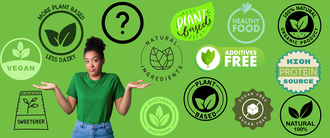
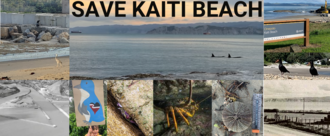

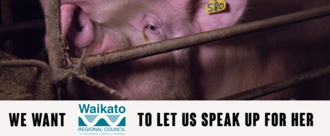
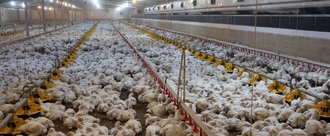
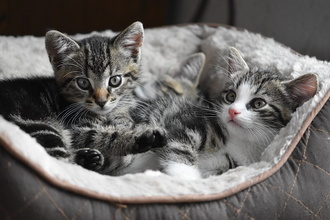
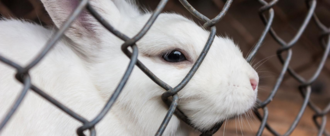
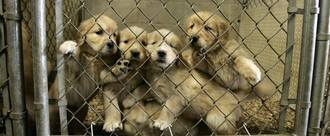
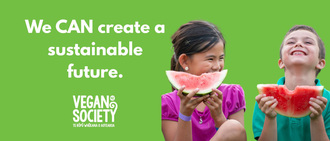
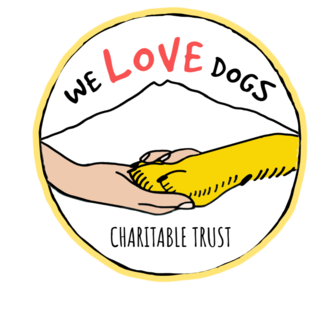.png)
